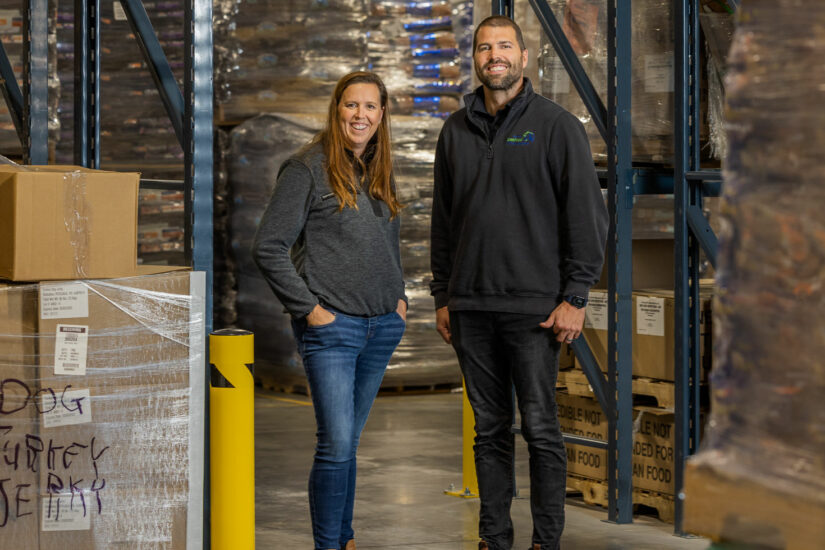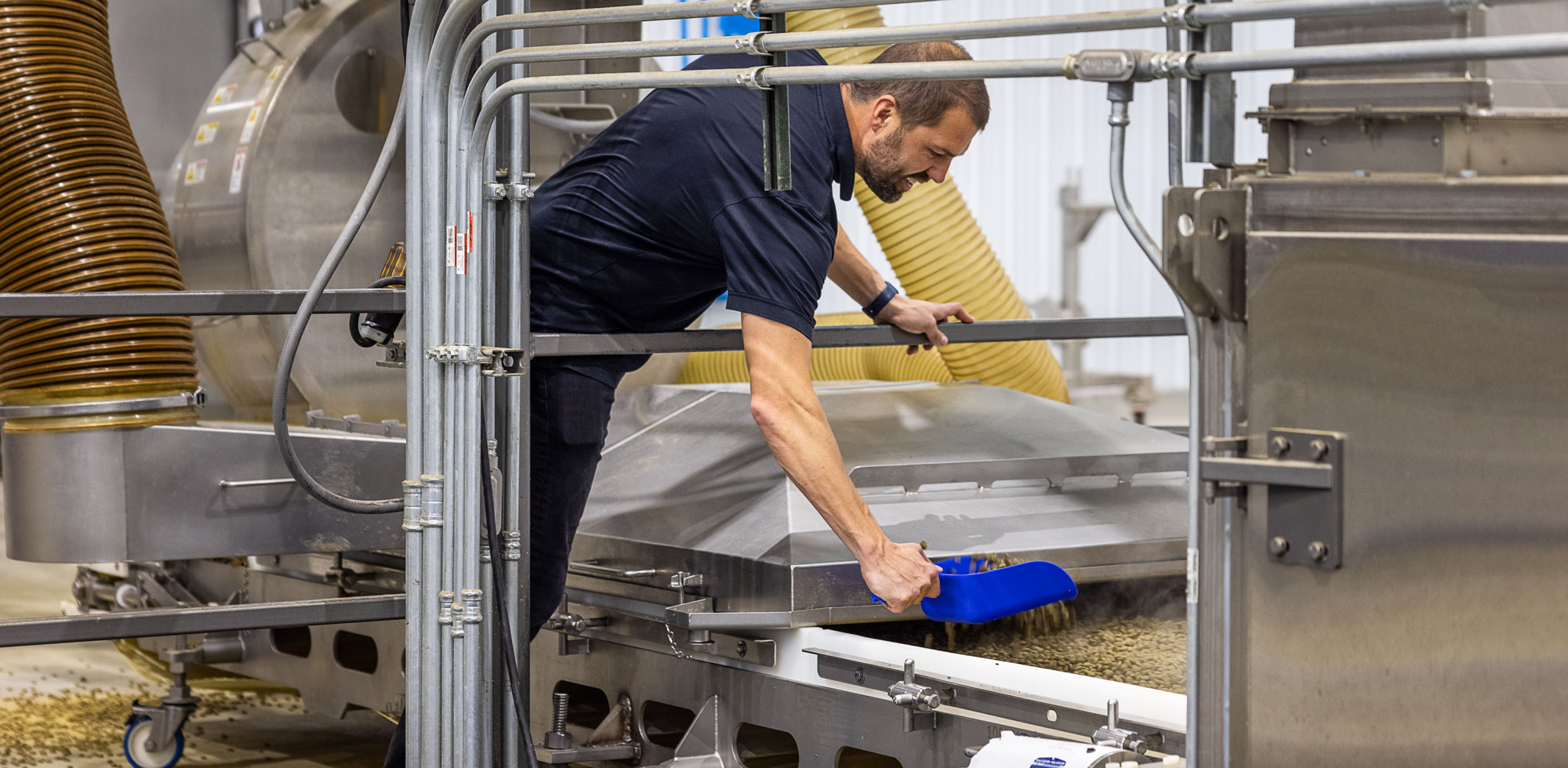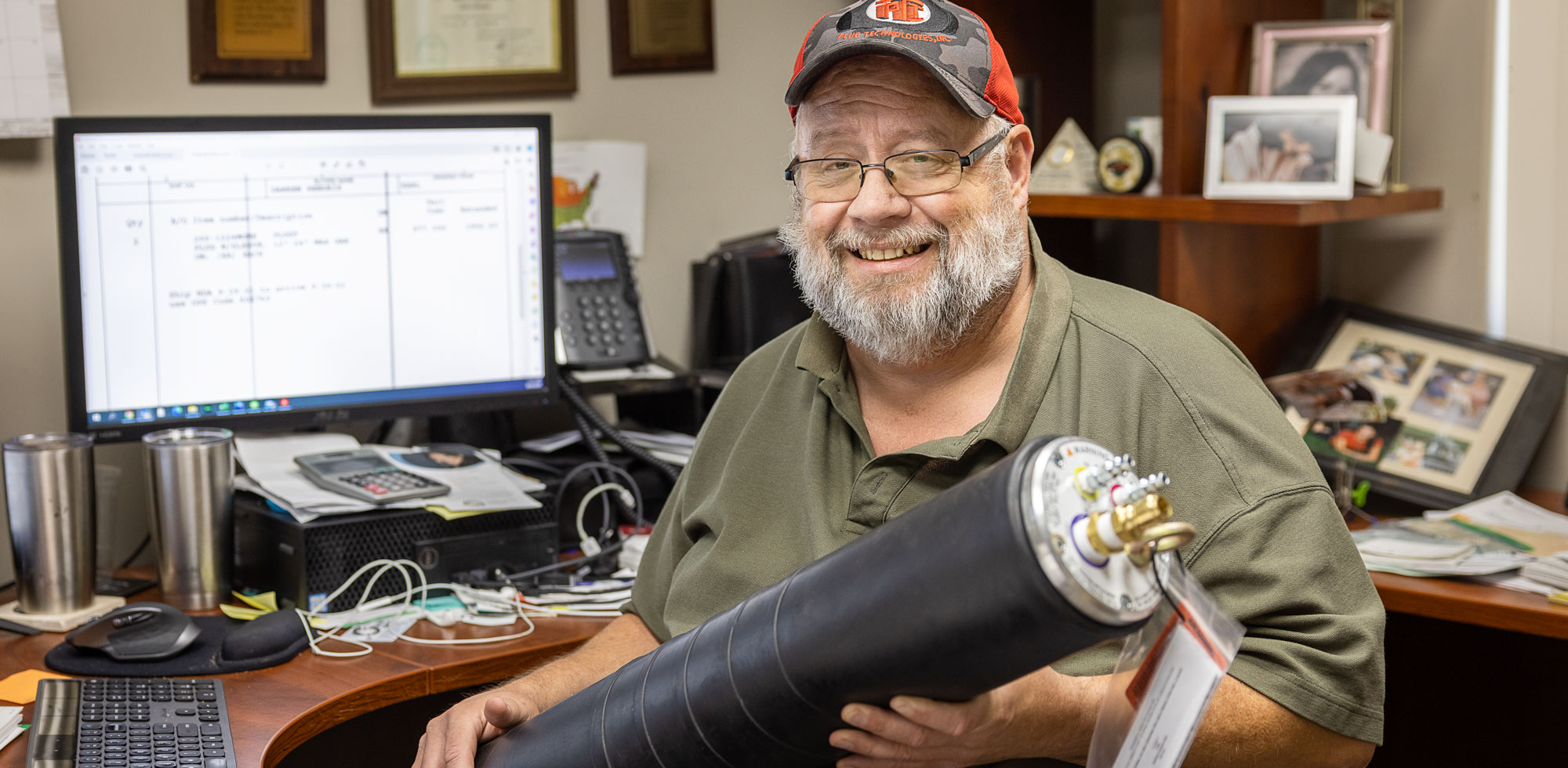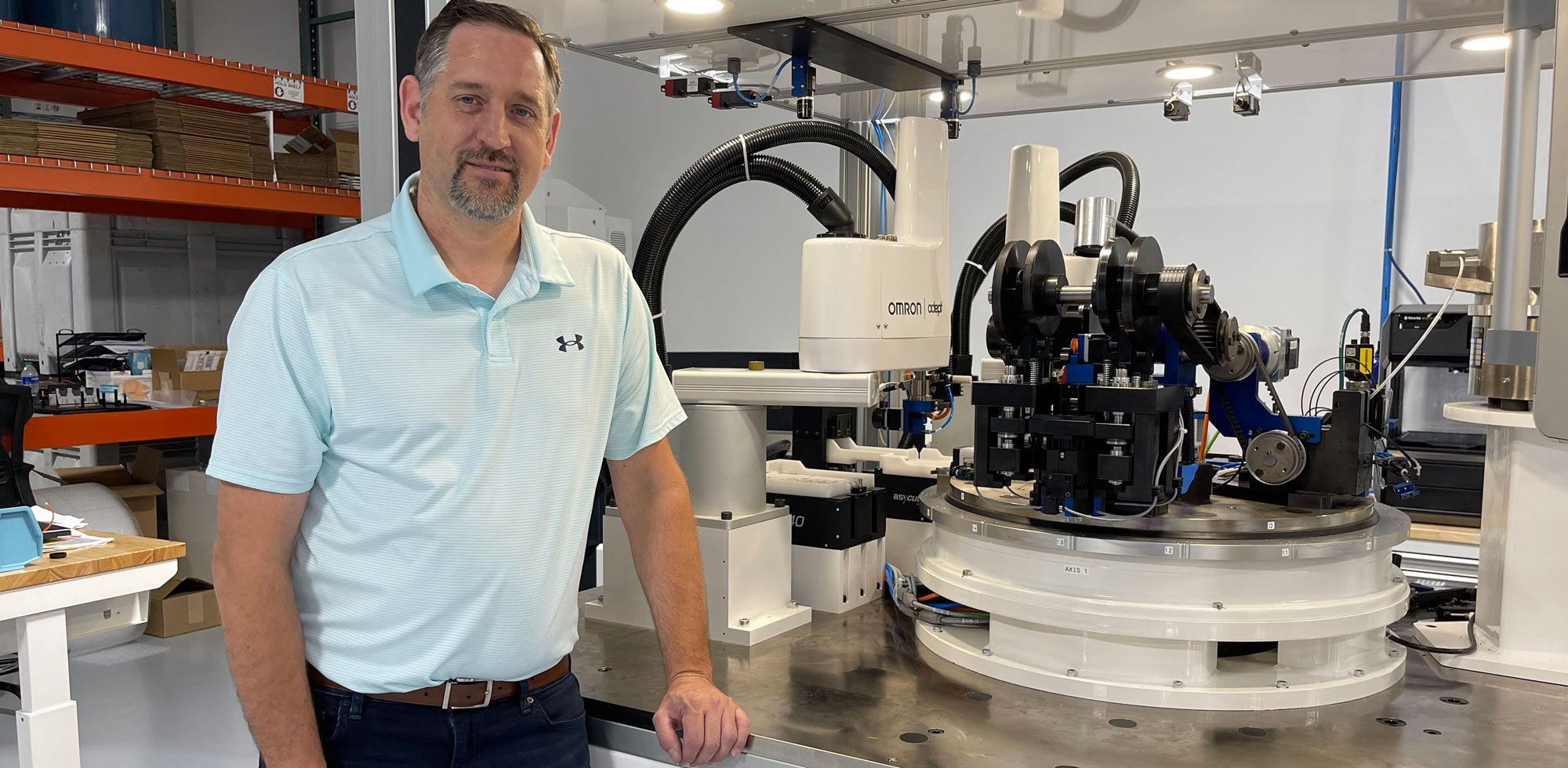
Entrepreneurial Spirit
Lending program helps growing companies expand, exceed goals and create jobs.
By Lisa Meyers McClintick | Photography by John Linn
As restaurants shut down, offices went silent and highways emptied during 2020’s stay-at-home quarantine, people embraced simpler joys such as the jingle of a collar and the excited dance of a pet just before kibble clatters into a food bowl.
The American Pet Products Association estimated 11.38 million households welcomed new dogs, cats, and other critters during the first year of the pandemic, fueling a record-breaking $103 billion in pet industry sales.
“People love their pets,” said Greg Zylka, mayor of Little Falls, a community that benefited from the sales surge since Barrett Petfood Innovations opened its new 165,000-square-foot plant in June 2020. Supported by a lending package that involved the Initiative Foundation and other local organizations, the company estimated at the time that it could create 60 to 100 new jobs.
In less than 18 months, up to 100 employees were busy at Barrett Petfood Innovations’ Little Falls location, and another 50 were added to its Brainerd location to support the production of 450 premium pet food products.
“We definitely did not expect to have this many employees today when we started in Little Falls,” said Tom Barrett, owner and co-managing director with his sister, Sarah Barrett. “The pandemic did create an additional demand that we didn’t forecast.”
Financially supporting rising manufacturers such as Barrett Petfood Innovations helps stabilize and strengthen the regional economy, especially when markets shift, technology changes or other economic forces hit employers. By the end of 2021, two local companies were expected to close: IWCO Direct, a Little Falls direct mail company with 300 employees, and Coleman life-jacket plant in Sauk Rapids, with 175 employees.
Across the region, the Initiative Foundation has helped to fill the gap for new and expanding businesses when traditional lending reaches its limits. Ideally, new or expanding companies show an entrepreneurial spirit that elevates their business above and beyond their initial expectations.
In this edition of IQ Magazine, we look at three such businesses—from large to small: Barrett Petfood Innovations, Plug Technologies in Hanover and startup business Advanced Interconnect Technologies of St. Cloud.
“These three projects showcase how our programs can be supportive of business growth and expansion,” said Dan Bullert, Initiative Foundation senior business finance manager. “It’s important for us to support small and large projects. We want to help younger companies to get established, too, and continue to grow in the future and to add employees.”

Barrett Petfood Innovations
Before Barrett Petfood Innovations could begin construction on its production plant in Little Falls’ Chief Hole in the Day Industrial Park in 2019, it needed a $23 million financing package. The Initiative Foundation joined with other lenders and provided its maximum loan of $500,000 to help the project move forward.
The operation ramped up quickly, and today the company is looking to add a production line at Little Falls in late 2022 or 2023, doubling its output. It’s also investing about $40 million in an 80,000-square-foot freeze-dry facility that’s under construction across the road from its Little Falls plant.
The freeze-dry facility, called North Freeze Dry, may open by next June and will be a partnership with Anchor Ingredients of Fargo. Instead of dealing with delays of up to four months to get its much-needed pet food ingredients, North Freeze Dry will support Barrett Petfood Innovations by using five freeze dryers to process three to five million pounds of meat per year.
The freeze-dry facility requires an even bigger investment due to the heavy refrigeration required for chicken, turkey and pork from Central Minnesota and the Midwest, along with imported whitefish and salmon from northern coastal states, duck, lamb, and kangaroo from Australia and New Zealand.
Freeze-dried meats can be packaged separately or blended with kibble made at the main Little Falls plant. North Freeze Dry is expected to employ about 60 people with two shifts, but like the first Little Falls plant, demand could require an expansion soon after opening.
In addition to the manufacturing jobs, the company has bolstered the area economy through construction of its facilities and by supporting area growers with locally sourced ingredients such as Smude’s sunflower seed oil, chicken and poultry, and crops such as millet, sorghum and peas.
“We’re a very global business,” Barrett said, “but we also try to do anything we can do locally.”
Barrett wants to become for the pet food industry what Larson Boats, a former and longtime Little Falls company, was for the boating industry, said Mayor Zylka. “They want to be that staple in our community that people can rely on for employment.”

Plug Technologies
When excavators carve into the ground to build homes, businesses or to replace aging water lines, chances are high the crews will need a pneumatic pipe plug to cap off water and stormwater lines so the work can be done.
Plug Technologies has worked to make that process easier—and safer—since owners Karl Trott, Marc Bevacco and Glen Meyer teamed up in 2013 to create the company in Hanover on the southern edge of Wright County.
It was the first pneumatic pipe plug company to start in more than 30 years, and they built it from the ground up with a 13,000-square-foot building plus manufacturing equipment they designed and installed over 14 months. They had to create and test their product until it was superior enough to carve out a competitive spot in the 60-year-old industry.
Besides always having an easy ordering process and the ability to reach one of their staff, Plug Technologies had stood out with components such as U.S.-made couplers, liquid-filled gauges, and protectors around the gauges.
“It’s a lot of the small stuff that resonates with the customers,” said Trott. “The small stuff are the things that cause [customers] trouble.”
Startups such as Plug Technologies often don’t have the capital or experience that conventional lenders may require.
“We provided a $235,000 working capital and inventory loan on a 10-year repayment plan, but they paid us off two years early,” Bullert said. Plug Technologies also paid off a second loan of $192,000 that helped finance equipment.
Once new companies gain momentum, they can secure future financing more easily. Plug Technologies has grown during building booms and found a solid market with rental companies. Renting the plugs makes more sense than contractors buying plugs, putting them in a truck with extreme temperature swings and risking degrading the rubber.
If a compromised plug loses its seal in areas with a high water table, a flooded job site could prove costly by pushing back construction progress, Trott explained.
The company doesn’t share sales figures, but “from 2015 to 2019, we’ve averaged 60 percent annual growth,” he said. The pandemic slowed the company’s growth in 2020. “This year, we’re back up over 60 percent growth.” The company started with fewer than 10 employees, but they’re now up to 28 and hoping to break ground on a 6,000-square-foot addition before the end of the year.
“We could add another half a dozen [employees],” Trott said. “We literally can’t keep up. The more people we can get, the more plugs we can make and sell.”

Advanced Interconnect Technologies
A 26,000-pound robotic machine at Advanced Interconnect Technologies in St. Cloud is a wonder to behold: In just over 16 hours, it produces a precise component for an Abrams armored tank. Parts such as heat sinks (an aluminum chassis) for circuit boards used on fighter jets can be made faster. Across the shop floor, another machine can produce 4,000 parts per hour—each only a few millimeters in size—that are destined to be used as military-grade connectors and circuitry.
No matter the size or production time, final products at this 2020 startup company need thorough testing to show they are durable enough for extreme aerospace and defense industry conditions and are dependable enough for vital satellite communications.
“Satellites help provide key information to make sure soldiers get home safely,” said company owner Jason Smith. “[These components] are truly making an impact on people’s safety. There’s a lot of meaning in that.”
Smith leverages 24 years of industry experience, starting with precision manufacturing, tooling, and automation for Little Falls-based Central Minnesota Tool. When Texas-based AirBorn bought the company in 2007, Smith transitioned into developing new products and the manufacturing technology to produce it. That led him to develop space-rated optical cable that could withstand radiation, vibration and other extremes.
Smith started Advanced Interconnect Technologies in March 2020 as an agile, flexible shop that could quickly fill small and short-run orders. The business started in a leased 1,650-square-foot building in Sauk Rapids, but between running out of space and someone else buying the building, he needed to move. Finding larger, appropriately zoned leased space wasn’t working.
“There weren’t many options other than to buy,” he said. The Initiative Foundation partnered with lead lender Stearns Bank and provided a $23,750 loan that helped Smith buy the former American Standard plumbing building along Highway 10 in St. Cloud.
The move enabled the company to triple its space with 5,335 square feet and a nearby lot for future expansion. The company also has grown to five full-time employees—including two machinists/CNC programmers, an electrical engineer and inspector—and a few part-timers. They have a handful of machining areas with space for up to 14, including the more flexible, open-sided workstations.
“Our goal is to outgrow this [building] in three years,” he said, “and the land in five years.”
Historic 35-year BUSINESS FINANCE FIGURES
- 1,142 NUMBER OF LOANS
- $60M+ VALUE OF LOANS
- $424M LEVERAGE AMOUNT*
- 8,760 JOBS RETAINED
- 5,545 JOBS CREATED
* As a gap lender, the Initiative Foundation partners with local banks and credit unions who serve in the lead lender role. The amount leveraged represents the amount of money our lead-lender banks and institutions have provided to finance business startups and expansions throughout the region.